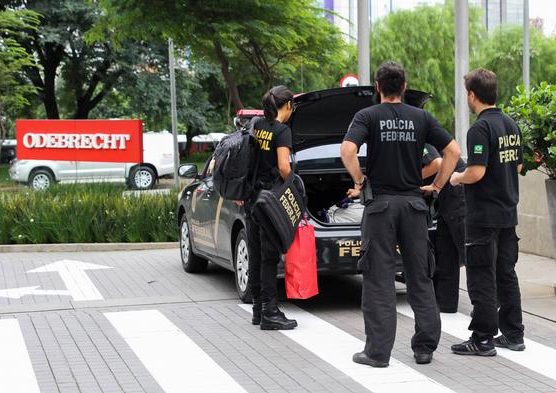For over a year, Brazilian federal police could not access the files on Marcelo Odebrecht’s notebook computer. They tried using the password from Marcelo’s cell phones, with no luck.
Even Marcelo himself could not access the computer, as his password had been generated by two different electronic tokens that change combination with each access, and he no longer had the tokens following his arrest.
When the investigators finally accessed Marcelo’s computer, the emails, spreadsheets and data they found opened a window into a massive corruption scheme that supported a record 2016 corruption settlement by Odebrecht’s family business with authorities in Brazil, the United States and Switzerland. The company, Odebrecht SA, admitted to paying $800 million in bribes in exchange for lucrative public infrastructure projects in Brazil and a dozen other primarily Latin American countries.
The scandal touched all parts of Brazilian political and corporate life, contributing to the 2016 impeachment of former president Dilma Rousseff and the conviction of popular former president Luiz Inacio Lula da Silva, who has been sentenced to nearly 10 years in prison on charges that he and his wife illegally received $1.1 million from Odebrecht in improvements for a beachfront apartment.
Through its infamous “Division of Structured Operations,” Odebrecht bribed its way into projects with Petrobras, the state-controlled oil company, while simultaneously gouging the oil giant on its contracts. A ten-page document written with an old typewriter, captioned the “Relacao de Parceiros” or relationship of partners, contains 530 names along with their respective nicknames and projects to which they were linked.
In 2016, Odebrecht and a related entity agreed to pay $3.5 billion in fines, but this was only the tip of the iceberg of the impact that the scandal would have across Latin America.
Since the settlement, prosecutors in nations across Latin America have requested evidence from Brazilian authorities concerning Odebrecht’s corrupt practices. What has followed is a reckoning of countless political officials and corporations for their involvement in the scandal. Most recently, the president of Peru, Pedro Pablo Kuczynski, tendered his resignation on the eve of a second impeachment vote that appeared certain to end his presidency. Evidence emerged linking Kuczynski to indirect payments from Odebrecht when he served as Peru’s economy minister.
Kuczynski initially denied the evidence, but then belatedly claimed the payments were made to business partners without his knowledge. Kuczynski released a prior president from prison days before surviving a December impeachment vote, but suffered an immense hit to his public approval as a result. The most recent last straw appears to have involved the release of video tapes allegedly showing a political ally offering public contracts in exchange for a “no” vote on Kuczynski’s impeachment.
Elected on a pledge to fight corruption, Kuczynski now has become the third Peruvian president to fall victim to the Odebrecht scandal, with one former leader sitting in pre-trial detention and another subject to an extradition request issued to the United States. Kuczynski’s private residences were searched by prosecutors over the weekend, as he is now under criminal investigation and barred from leaving the country.
All of these events come just weeks before Lima is to host Western Hemisphere leaders for the Summit of the Americas, an event boasting a now-ironic anti-corruption theme. In his first speech last week, new President Martin Vizcarra promised to fight Peru’s corruption. “Don’t lose faith in our institutions,” Vizcarra, who had been vice president, told the nation. “Let us show you that Peru is bigger than its problems.”
While Vizcarra transitions to power, Peruvian prosecutors are pursuing the Peruvian companies that worked with Odebrecht, including a group local media has labeled the “Construction Club,” consisting of companies that formerly worked closely with Odebrecht in Peru on massive public work projects ranging from the main coastal highway to agricultural irrigation systems. Prosecutors recently searched the offices of Peru’s largest business association, Confiep, after an Odebrecht agent testified to having given money to the group for political campaigning.
In the meantime, major projects worth billions of dollars and sales of facilities such as the Chaglla hydroelectric plant have been halted while prosecutors sort out the graft. Recent legislation seeks to ensure that funds from companies involved in bribery will be available to pay restitution to Peru. A member of the parliamentary committee considering the matter recently warned that “Every new revelation, every new detail, keeps telling us that this is bigger than we ever thought.”
The fallout is not limited to Peru. Investigations have spread in other countries, resulting in charges against a Colombian senator, a former vice president of Ecuador, a former economy minister in Argentina, and even Venezuelan President Nicolás Maduro. Countless others remain under review.
Brazilian prosecutors have been working closely with their counterparts in other countries to bring the corruption to light. Last year, the Brazilians hosted prosecution officials from 11 countries to form a joint investigation of Odebrecht’s bribery across Latin America. The cooperation declaration resulting from this meeting has allowed for sharing of evidence and witness testimony among the nations. These agreements, for example, have provided Peruvian prosecutors with access to Marcelo Odebrecht and other former company officials to quiz them about details of the graft in Peru.
Prosecutors also have several powerful new laws available to help in their fight against corruption. Brazil led the way with the Clean Company Act, which imposes strict liability on companies for acts of bribery committed in the company’s interest or for its benefit. Similar new laws took effect this year in Peru and Argentina. The new laws also emphasize the importance of corporate compliance programs, designed to detect and deter participation in future corruption schemes.
For companies doing business in Latin America, the best guidance is to keep abreast of the developments in the region and evolve compliance requirements to reflect the important changes in the environment. The guidance from the Justice Department and SEC recommends such continuous improvement, which may require updates to risk assessments and compliance policies, procedures and practices. This vigilance will help companies to avoid liability and the harm that comes from involvement in improper activity.
This article co-authored with Mr. Gregory Paw and was published on March 2018 in the FCPA Blog, USA.
Sandra Orihuela




